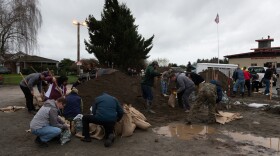When the Canadian government bought the controversial Trans Mountain Pipeline from Kinder-Morgan last year, it also bought a 69-mile-long spur that extends from the border with the U.S. and feeds Canadian crude to four Washington refineries.
The change in ownership triggered a required update to the oil-spill response plan for the spur, which has been operating since the 1950s.
Sandy Howard, Department of Ecology spokeswoman, says the state has now approved a new five-year plan.
“This pipeline has many water crossings. It crosses the Nooksack River twice. It crosses the Samish River, the Swinomish Channel and many creeks along the east side of Padilla Bay,” Howard said. “So, any of those water crossings is a very strong vulnerability, especially — Puget Sound is right there.”
She says the new plan corrects several deficiencies from the first one submitted by Trans Mountain. Many updates were guided by the state’s stronger Oil Transportation Safety Act, passed last year. Howard says these all add up to a stronger plan than ever before for the Puget Sound spur.
“You know, every time these plans are updated, they’re stronger, they’re more stringent, they’re more protective," Howard said. "And in particular, this plan calls out the heavy, tar sands sorts of oils that that pipeline carries. And it’s got steps in place, should we have a spill of that nature.”
In particular, it requires specific and swifter response to deal with these new forms of petroleum products. This includes approved contractors with specialized equipment for sinking oils, such as diluted bitumen, that are much harder to contain and clean up.
The plan also requires better identification and protection of resources put at risk during a spill, such as salmon and endangered orca whales.
Howard says these measures came partly in response to some 14,000 public comments Ecology received on the initial, proposed plan.
However, some environmental groups say the plan does not go far enough. Stephanie Buffum, executive director of Friends of the San Juans, says there may be a call for a re-write of the plan. She points out that the agency itself has recognized a lot more work is needed to understand and prevent harm from the effects of spilled oil on all forms of marine life in the Salish Sea.
And Buffum says this is particularly urgent now, after the recent news that two more of the Puget Sound’s 74 endangered Southern Resident orca whales may not live through this summer.
“The plan, it simply lacks information on Southern Resident whales, on their critical habitats, on the needs of other species in the marine water columns that are impacted by sinking and non-floating oils,” she said. “And that’s a piece that Ecology needs to go back and review and re-address — those impacts to Southern Residents.”
Another flaw she sees in the plan is the provision that guides responders to watch for orcas and protect the whales by shooing them away from the site of a spill. Buffum says this amounts to spotters banging on the side of a ship’s hull to deter the endangered whales.
“That’s not the best that we can do in Washington state," she said. "That’s not the best that we can do for our Southern Resident killer whales.”
Correction: a previous version of this story stated that the Puget Sound Pipeline feeds five refineries in Washington state. The correct number is four. We regret the error.







